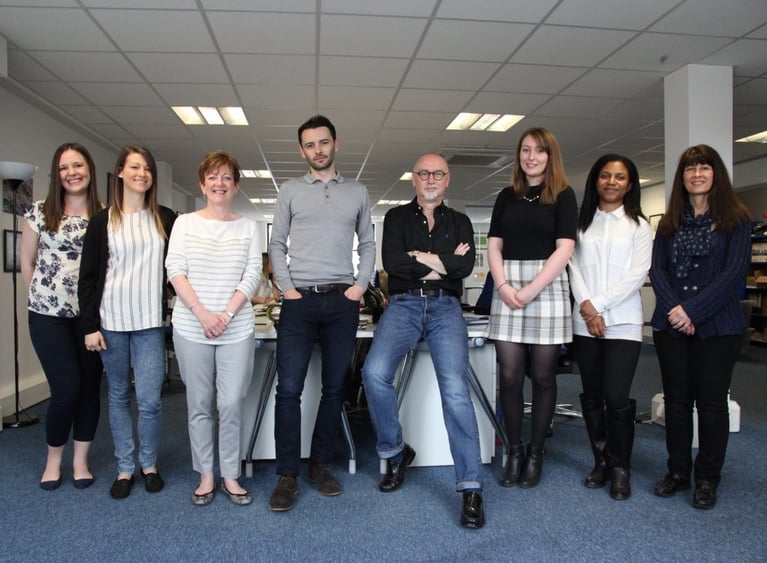
Career Wisdom from Women in Public Relations
What Women in PR Really Want You to Know About Professional Success I was once given an award for perseverance as a child and the sentiment has stayed with me. The ability to keep trying my best even when it’s challenging is deeply ingrained. It’s been a quality that’s served me well so I hold no hesitation in sharing that advice with others. So, in honour of Women’s History Month, I wondered what other women in PR would offer as career advice. Here’s what my wonderful colleagues had to say:

Why you should follow your dream into PR
The key to career happiness is to follow your childhood dream, new research has revealed.

A look back at BlueSky Education in photos
As BlueSky Education approaches its tenth year, we take a look back at some of the greatest moments we’ve captured on camera in the last decade.

Does Feminism have a PR problem?
I am proud to call myself a feminist. And by feminist, I mean I believe in equality between genders – there’s no bra-burning, man-hating, tunnel vision going on here – just a simple desire for a level playing field.

The most annoying misconceptions about PR
Most people don’t understand what public relations is. Part of the problem is that it varies so much across different industries – from working in product PR and sending out samples, to organising huge launch events, to sticking your head inside a research paper and condensing it into a press release – it’s all PR. The purpose is pretty much always to promote something or someone, raise the profile, get seen, be talked about. To this day – and despite half a decade at this very agency – my parents still aren’t totally sure what I do. “The stereotypical “PR? Oh, so you just push out press releases then?” or the equally demeaning “PRs spend their time lunching, getting drunk and talking b*ll*cks” perspective,” is something that particularly irritates our Head of Practice, Kerry Ruffle. “Yes, PRs will distribute press releases, but it’s only a small part of a job which takes a great deal more creativity and forethought to do with any degree of success. “A press release, when written intelligently and used correctly,” she says, “is still an incredibly powerful tool. The problem is too many misinformed, time-pressed or plain lazy media professionals do not take the necessary time to write a release which considers who the intended audience is and what information would be most relevant to them, set it out clearly and concisely and, finally, actually send it to the right people!” As for going out and getting drunk all the time – if that’s true then we’re doing it wrong! Sophie O’Sullivan, Account Executive here at BlueSky, agrees. “A popular misconception is that PR provides a glamorous lifestyle consisting of no real work - only attending events and partying. Stereotypes like this have come into people’s consciousness because of characters such as Samantha Jones in Sex and the City, a PR who stated that, ‘’I don’t believe in the Republican party or the Democratic Party, I just believe in parties.’’ It's an opinion that’s rife among many of those who speak to our team. Kate Mowbray, Senior Account Executive, has had people think that she just goes to events and hands out free products to bribe journalists. Peter Remon, also a Senior Account Executive on the team, has had to battle the suggestion that PR is all about social media and he spends the whole day using Twitter. Really though? We spend our time interviewing fascinating alumni and pitching their stories of success, from setting up companies worth millions to changing whole industries. We dive into complicated research papers and craft short, sharp press releases. We arrange meetings with journalists all around the world, from Sydney to Singapore. We help target markets for student recruitment. We develop effective social media strategies. We offer expert advice on the business education landscape, and so much more.
Is it cool to be kind in PR?
Hard-nosed, cut-throat consultants. Thick-skinned, full of false charm and selfish arrogance. Is that what you think of when you imagine a PR professional? Do you picture PR agency directors barking orders and waiting for hot coffee from shaking interns? I hope not because, personally, I think it’s rather cool to be kind in this industry. Perhaps it’s my Millennial attitudes surfacing. I’m all for doing good by people. I want to work for people who care about me and I want my colleagues – as well as my clients – to know I genuinely care about them. After all, I have only seen it produce positive results. If you know that you are valued and feel like you can make a difference to someone’s day, then you simply perform better. It’s about making that extra effort to pitch until there’s a ‘yes’, to research a country’s media until you understand it’s entire landscape, or to get up extra early to speak to someone in another time zone. Those are the actions of hardworking teams who want to achieve excellent outcomes – and it can be nurtured by kindness. By listening to everyone’s ideas, by creating a space where you don’t feel as though your job is on the line because the traffic was bad and you were five minutes late. Despite our sector’s somewhat harsh reputation, kindness is a feeling that’s woven into our culture here at BlueSky Education.
How to build a perfectly performing PR team through personality
Are you demanding and competitive, or patient and relaxed? Cautious and formal, or sociable and enthusiastic? Even if they are opposites, all of these traits are positive – so bringing these personalities together can make the most impressively effective PR teams. But how can you do it in your own company? Take a look at ‘Insights Discovery’ to see how people have dominant characteristics. It’ll group personalities into Cool Blue, Fiery Red, Earth Green, and Sunshine Yellow. We are all unique combinations of these colours. This psychology tool helps to understand strengths and weaknesses, communication style, approach to problems, and value to the team. By building teams with people spread across these personality types, you’re more likely to create high-performing groups. While people don’t fit perfectly into a segment, it’s easy to see what traits they are lead by. I’d say that I was largely Fiery Red – being rather strong-willed and purposeful – with a good dose of both Sunshine Yellow and Earth Green. When I look at other members of the BlueSky team, it’s easy to pick up and admire Kerry’s Cool Blue characteristics of precision and logic, Peter’s Earth Green traits of patience and relaxation, and Kate’s Sunshine Yellow qualities of enthusiasm and spontaneity. Bringing these individual traits together here at BlueSky have built a strong, productive team. With our differences come rounded decisions, considerate teamwork, and a broad focus. While those of the team who lean towards Cool Blue might tend to focus on problem-solving, the Fiery Red workers look to results, Sunshine Yellow focuses on interactions, and Earth Green looks to maintain harmony. It’s simple to see why it works.

What would BlueSky PR study at business school?
Working with business schools on day-to-day basis, you learn about the incredible array of courses that they offer. With some specialisms like luxury attracting very different profiles to finance or perhaps entrepreneurship, I wondered what our team would be interested in studying.
What degree do I need to get into PR?
Which degree is best for a career in PR? There’s no definitive answer. The PR industry benefits from variety – BlueSky PR certainly does! Languages, humanities, social sciences. We’ve graduated from an array of subjects, and our diverse experiences have all helped us in our careers. Take BlueSky’s Natalie Bishop who graduated from the University of Sheffield in English and Philosophy. She says her degree taught her there are always alternative ways of phrasing something. This helps Natalie in PR today, like Steph King, Head of Recruitment Practice at BlueSky, who learnt how to express things clearly and concisely from her Bachelors in Politics from the University of Warwick. “I also learnt a fair amount about drinking,” she said, “something that many people think is a prerequisite of working in PR. Sadly the days of taking journalists for boozy lunches are a thing of the past… in most cases anyway!” Regardless of topic, prioritise communication skills Going from student seminars to working lunches, Bruce Callander, who graduated from Newcastle University in Sociology and Politics, said: “You need to be able to communicate effectively in PR, obviously. Most of my course was seminar based and having regular discussions and debates helped to develop my communication skills. “Generally, I think you need to like learning about things and taking on knowledge – though I’m not sure if that can be taught!” As well as Bruce and graduates from the likes of politics and philosophy, BlueSky counts journalism, law and business alumni in its ranks too. Ian Hawkings, Head of Education Practice at BlueSky, holds a degree in Business and Management with Finance. He says: “I learned about business from a variety of perspectives, but where it has helped me in PR is to be able to see the business case for PR – and how it fits into a company’s overall strategy. This is helpful when working with clients to identify how they could use PR and communications to hit their strategic targets.” What about a degree in Public Relations?
Gender diversity: Let's talk about progress
It’s been an interesting week for British women. Not only has the Church of England voted to allow women to become bishops for the first time in its history, David Cameron’s reshuffle has doubled the number of women in Cabinet to eight. This has seen an influx of articles that insist progress is forging new pathways like never before, yet others that argue change is still desperately needed and, in a way, they’re both right. Which isn’t surprising when you consider that gender equality is a topic that remains high on the news agenda – inextricably connected to issues of diversity and leadership – and that’s why the headlines this week were littered with “women bishops” and “women MPs”. Headlines like these simply won’t stop being front page news while female representation remains so low. Essentially, the issue here stems from the lack of women in leadership.
Is PR to blame for the Monday blues?
Rush hour traffic, an overflowing inbox and the working week ahead. Yes, it’s Monday again. But did you know, you might hate Monday because of a PR stunt? ‘Blue Monday’ was a name given to a date in January to be the most depressing day of the year – and it was all part of a publicity campaign. It was included in a press release by the public relations agency appointed by Sky Travel. My colleague, Alex Dobocan, said: “Blue Monday came about as a PR stunt but it seems to have had success and made us all regard Mondays as… well, depressing. “Whilst we all dread endings and we could agree they are never all that pleasant, when it comes to ending a week we are more excited than anything! So why are we not treating Monday as any other start? - An exciting time to make things happen, to plan and to conquer.” Monday: the day we love to hate Taking this positive attitude, and inspired by a paragraph on Tumblr, I’d like to tell you a little more about these Mondays that we love to hate.
